 Much of our politics in the U.S. these days warrants more mockery and less outrage. Some, however, warrants more concern than Americans may yet fully appreciate. We discuss all of the above on today's BradCast. [Audio link to full show is posted below this summary.]
Much of our politics in the U.S. these days warrants more mockery and less outrage. Some, however, warrants more concern than Americans may yet fully appreciate. We discuss all of the above on today's BradCast. [Audio link to full show is posted below this summary.]
First up, we started the year with many Democrats troubled by what Republicans might do with their Committee "investigations" upon gaining back majority control of the U.S. House. We advised at the time that the promised Committee probes of stuff like Hunter Biden and the so-called "weaponization" of the U.S. Government were more likely than not to backfire on Republicans.
If last week's impressively aggressive response by House Democrats to Chair Jim Jordan's supposed FBI "whistleblowers" is any indication, things are already going quickly South for them. The Dems' 300+ page report [PDF] details the testimony and backgrounds of the first of these "whistleblowers" to be interviewed by the new House Select Subcommittee on the "Weaponization of the U.S. Government." They turn out not to be whistleblowers at all, but paid Donald Trump shills and disgruntled conspiracists who are unable to cite any actual violations of law, according to the Democrats report.
In a similar vein, we strongly recommend mockery as the correct response to Tucker Carlson's silly, cherry-picked segments this week, supposedly based on 40,000 or so hours of U.S. Capitol security camera footage from January 6, 2021, turned over to him by House Speaker Kevin McCarthy. Tucker is hoping to rewrite the history and known facts of Trump's deadly insurrection as little more than "sightseeing" and "mostly peaceful chaos". As it turns out, the U.S. Capitol Police chief, top elected Republicans in the Capitol that day, and, yes, even Fox "News" itself, seem to strongly disagree with Tucker's attempted revision of history.
But, while much of the phony outrage by far-right trolls like Carlson and Jordan deserve more laughter and mockery than outrage or panic from Dems, there is still plenty to be concerned about in our post-Trump politics, according to fascinating findings from researchers based on a nationally representative survey of 1,500 Americans from strong Democrats to independents to strong Republicans.
One of the most alarming findings is that "majorities of every political stripe agree or strongly agree with" the statement that "the only way our country can solve its current problems is by supporting tough leaders who will crack down on those who undermine American values. "
That, of course, sounds somewhat like authoritarianism, though the researchers left concepts like "current problems", "crack[ing] down", and "American values" intentionally vague in their survey for reasons they explain on today's program.
We're joined today by two of the report's four authors, Allegheny College Asst. Professor of Political Science TARAH WILLIAMS and Associate Professor ANDREW BLOESER, Director of the college's Center for Political Participation. Their recent article, summarizing their study's findings, leads with the troubling news of majorities, across all partisan lines, who support "crack[ing] down on those who undermine American values."
"It was fairly remarkable," Williams explains. "We anticipate that those who are answering this as Strong Democrats vs. Strong Republicans may have quite different visions of those folks who undermine American values. But the fact that there is this visible support across the board, we thought was really quite concerning."
The researchers discuss findings on partisan positions regarding things like "bending the rules" or "using rough language" to criticize political rivals or to "get things done," as well as how Americans feel about shutting down news organizations "attempting to undermine American values". Unsurprisingly (if still disturbingly) 72% of self-identified "strong Republicans" either agree or strongly agree with shutting down news organizations. Troubling in another way, a third (33%) of Strong Democrats feel the same way!
As to why some of the terms used in the survey are left intentionally vague, Bloeser explains, "Respondents may have their own ideas about what 'American values' mean to them. The next critical question is, 'What would you do in the service of your values? You believe that you are right, therefore, are you willing to say some groups in society should be, in a very blanket way, criticized, demeaned? Do you think that we should shut down the free press, something that is clearly anti-democratic? Do you think that it's fair for a leader to bend the rules for some groups in society to the detriment of others?' So you might have a variety of different goals that you think are noble in mind, but at the point where you're willing to undermine democracy, you're trading in something pretty significant there."
"Significant proportions of people across the political spectrum, but especially on the political right - Republicans and Strong Republicans --- are willing to say that crackdowns on entire groups, shutting down the free press, and bending the rules for people like them would be acceptable in service of what they think America should be. And that really is the pattern that we want be concerned about."
"It's not a tie," Bloeser is careful to note. "We certainly see it more on the political Right among self-identified Republicans. But the fact that some of those attitudes also exist fairly widely among Democrats should also be a concern. Because when one group starts to see another group as an existential threat, these are the things that can pull apart the fabric of society, and that can really undermine democracy."
Their study, published by Cambridge University Press, is titled "Are Stealth Democrats Really Committed to Democracy?" Williams makes clear that the reference is to small "d" democrats, as opposed to the Democratic Party.
"'Stealth democracy' is a notion that there are some individuals who would prefer a government that they don't really have to see," she tells me. "They don't like high-conflict politics. They think people making compromises is weak or failing to represent values. And they think it's a slog, which, let's be honest, policy-making is. So for those reasons, people who tend to be stealth democrats tend to prefer this expedient process that in a lot of ways looks distinct from what we think about as the necessary machinations of democracy."
As I note in response, "stealth democracy" sounds a whole lot like autocracy to me. Neither Williams nor Bloeser seem to disagree...
(Snail mail support to "Brad Friedman, 7095 Hollywood Blvd., #594 Los Angeles, CA 90028" always welcome too!)
|


 No Way Home: Trump's Iran War a Spreading, Chaotic, Deadly, Disaster: 'BradCast' 3/3/26
No Way Home: Trump's Iran War a Spreading, Chaotic, Deadly, Disaster: 'BradCast' 3/3/26 'Green News Report' 3/3/26
'Green News Report' 3/3/26
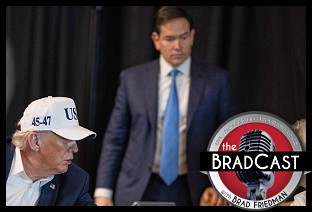 Trump Attacks Iran in 'Operation Epstein Fury': 'BradCast' 3/2/26
Trump Attacks Iran in 'Operation Epstein Fury': 'BradCast' 3/2/26 Sunday 'No, More Wars!' Toons
Sunday 'No, More Wars!' Toons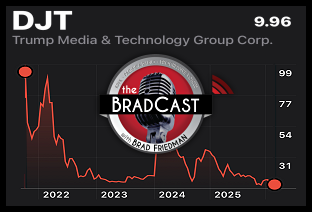 Loser Trump's Unlawful Tariffs, Failed Media Company, Corrupt SCOTUS: 'BradCast' 2/26/26
Loser Trump's Unlawful Tariffs, Failed Media Company, Corrupt SCOTUS: 'BradCast' 2/26/26 'Green News Report' 2/26/26
'Green News Report' 2/26/26 The State of the Union is ... Insane.
The State of the Union is ... Insane.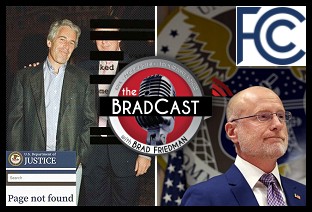 FCC's New 'Threat' to Broadcasters; NPR Confirms DOJ's 'Missing' Trump 'Rape' Docs: 'BradCast' 2/24/26
FCC's New 'Threat' to Broadcasters; NPR Confirms DOJ's 'Missing' Trump 'Rape' Docs: 'BradCast' 2/24/26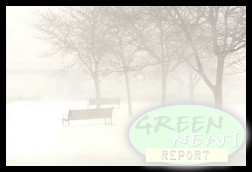 'Green News Report' 2/24/26
'Green News Report' 2/24/26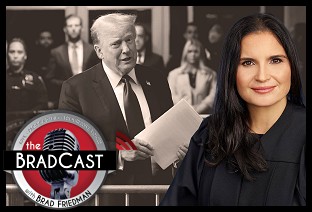 Aileen Cannon May be Covering Up Evidence of Trump Rape: 'BradCast' 2/23/26
Aileen Cannon May be Covering Up Evidence of Trump Rape: 'BradCast' 2/23/26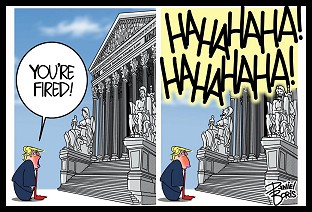 Sunday 'Plan B' Toons
Sunday 'Plan B' Toons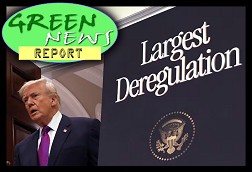 'Green News Report' 2/19/26
'Green News Report' 2/19/26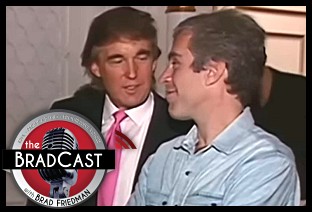 DOJ Hiding Evidence of Trump Rape, Assault Allegations: 'BradCast' 2/19/26
DOJ Hiding Evidence of Trump Rape, Assault Allegations: 'BradCast' 2/19/26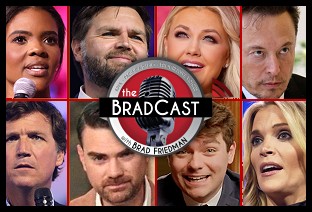 'No More Fig Leaves': Antisemitism Rising Inside MAGA, GOP: 'BradCast' 2/18/26
'No More Fig Leaves': Antisemitism Rising Inside MAGA, GOP: 'BradCast' 2/18/26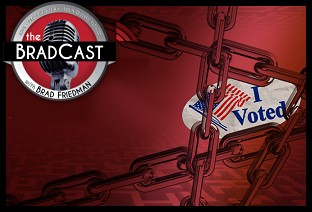 'SAVE America Act' Designed to Save GOP, Undermine Democracy: 'BradCast' 2/17/26
'SAVE America Act' Designed to Save GOP, Undermine Democracy: 'BradCast' 2/17/26 Court Blocks Hegseth Censure of Sen. Kelly
Court Blocks Hegseth Censure of Sen. Kelly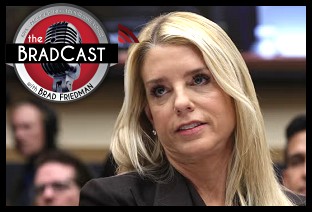 Harpy Tantrums, Legal Losses, Election Fails, Retreating ICE: 'BradCast' 2/12/26
Harpy Tantrums, Legal Losses, Election Fails, Retreating ICE: 'BradCast' 2/12/26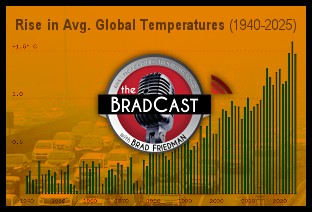 Trump to Reverse EPA's Landmark 'Endanger-ment Finding': 'BradCast' 2/11/26
Trump to Reverse EPA's Landmark 'Endanger-ment Finding': 'BradCast' 2/11/26 Trump's Racism, Corruption, 'Culture War': 'BradCast' 2/10/26
Trump's Racism, Corruption, 'Culture War': 'BradCast' 2/10/26 About Trump's FBI Raid of Fulton County, GA Election Hub: 'BradCast' 2/9/26
About Trump's FBI Raid of Fulton County, GA Election Hub: 'BradCast' 2/9/26
 VA GOP VOTER REG FRAUDSTER OFF HOOK
VA GOP VOTER REG FRAUDSTER OFF HOOK Criminal GOP Voter Registration Fraud Probe Expanding in VA
Criminal GOP Voter Registration Fraud Probe Expanding in VA DOJ PROBE SOUGHT AFTER VA ARREST
DOJ PROBE SOUGHT AFTER VA ARREST Arrest in VA: GOP Voter Reg Scandal Widens
Arrest in VA: GOP Voter Reg Scandal Widens ALL TOGETHER: ROVE, SPROUL, KOCHS, RNC
ALL TOGETHER: ROVE, SPROUL, KOCHS, RNC LATimes: RNC's 'Fired' Sproul Working for Repubs in 'as Many as 30 States'
LATimes: RNC's 'Fired' Sproul Working for Repubs in 'as Many as 30 States' 'Fired' Sproul Group 'Cloned', Still Working for Republicans in At Least 10 States
'Fired' Sproul Group 'Cloned', Still Working for Republicans in At Least 10 States FINALLY: FOX ON GOP REG FRAUD SCANDAL
FINALLY: FOX ON GOP REG FRAUD SCANDAL COLORADO FOLLOWS FLORIDA WITH GOP CRIMINAL INVESTIGATION
COLORADO FOLLOWS FLORIDA WITH GOP CRIMINAL INVESTIGATION CRIMINAL PROBE LAUNCHED INTO GOP VOTER REGISTRATION FRAUD SCANDAL IN FL
CRIMINAL PROBE LAUNCHED INTO GOP VOTER REGISTRATION FRAUD SCANDAL IN FL Brad Breaks PA Photo ID & GOP Registration Fraud Scandal News on Hartmann TV
Brad Breaks PA Photo ID & GOP Registration Fraud Scandal News on Hartmann TV  CAUGHT ON TAPE: COORDINATED NATIONWIDE GOP VOTER REG SCAM
CAUGHT ON TAPE: COORDINATED NATIONWIDE GOP VOTER REG SCAM CRIMINAL ELECTION FRAUD COMPLAINT FILED AGAINST GOP 'FRAUD' FIRM
CRIMINAL ELECTION FRAUD COMPLAINT FILED AGAINST GOP 'FRAUD' FIRM RICK SCOTT GETS ROLLED IN GOP REGISTRATION FRAUD SCANDAL
RICK SCOTT GETS ROLLED IN GOP REGISTRATION FRAUD SCANDAL VIDEO: Brad Breaks GOP Reg Fraud Scandal on Hartmann TV
VIDEO: Brad Breaks GOP Reg Fraud Scandal on Hartmann TV RNC FIRES NATIONAL VOTER REGISTRATION FIRM FOR FRAUD
RNC FIRES NATIONAL VOTER REGISTRATION FIRM FOR FRAUD EXCLUSIVE: Intvw w/ FL Official Who First Discovered GOP Reg Fraud
EXCLUSIVE: Intvw w/ FL Official Who First Discovered GOP Reg Fraud GOP REGISTRATION FRAUD FOUND IN FL
GOP REGISTRATION FRAUD FOUND IN FL

































